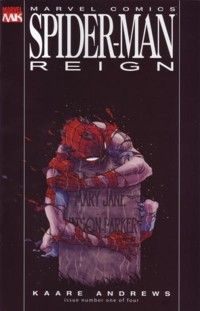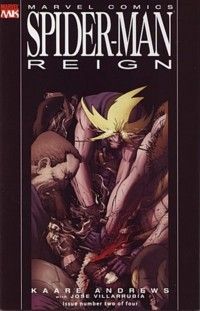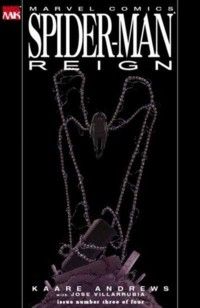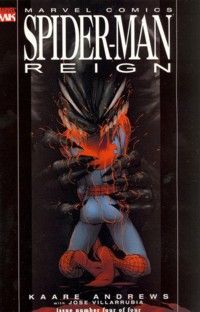Last week, it was the Frank Miller-influenced Batman: The Long Halloween and, this week, it's the Miller-influenced Spider-Man: Reign. Spoilers below.
Spider-Man: Reign by Kaare Andrews is a four-issue mini released through the Marvel Knights imprint back in late 2006/early 2007. It's an odd combination of a Dark Knight Returns future and Marvel's own "The End" line of books. In essence, you could see it was beginning with the former and being 'officially' considered the latter. It was most known for showing elderly Peter Parker's penis in the first issue (which was blurred in subsequent printings and collections) and, in the third issue, revealing that Mary Jane died of radiation poison thanks to Peter's radioactive spider-sperm. As always, here's what I thought when I first read it:
I'm actually not quite sure what to make of this book, because the Peter Parker/Spider-Man we get here isn't the same as any version I've seen before. The difference between the two facets of his personality verge on multiple personalities, probably one of the reasons why this feels like The Dark Knight Returns -- aside from the similarity in approach and some artistic similarities. That disparity put me off initially because it is so different, so out of the form for a Spider-Man story. Parker may have had his problems, but to go this far?
Same with the Mary Jane delusions...
But, I think it works. Parker has always been pushed far and, after Mary Jane's death, the idea that he would go off the deep end a little makes sense. He isn't completely insane -- just a tad insane.
There were a few elements of the story that weirded people out, particularly the radioactive spider-sperm that apparently killed Mary Jane. Seems like a logical extension of the character's powers to me and, well, a weird as fuck way to kill off MJ. What I noticed while reading this book was how it reflects on One More Day since the relationship between Mary Jane and Peter is held to such a high standard here -- it's elevated so much that it makes discarding it seem even worse. Of course, the two stories are unrelated, but can't help but see it that way.
There are many similarities to The Dark Knight Returns, including the style Kaare Andrews uses for the art -- there are some panels that look really close to Frank Miller's work from that era. However, I find it interesting that this book's subject matter is a lot closer to that of The Dark Knight Strikes Again as far as the antagonists go. Both of those books examine a post-9/11 world dealing with corrupt power figures that use security and terror to rule with iron fists, unafraid to use old villains to get their way, fighting against costumed heroes. In that way, I have a hard time taking Reign too seriously -- but I would say that it falls somewhere between the two Miller works. It's not as serious as DKR, but it's not as absurdly comedic as DKSA. (I could also see a little Channel Zero in the book during the broadcast part of the story.)
The use of Venom is interesting as Andrews gives the character some really solid motivation for his attacks on Parker, painting Parker as the true villain and the symbiote as an innocent bystander. It works well and gives the final part of the book a bittersweet "victory."
Actually, a lot of Reign is devoted to demonstrating that Peter Parker is a bit of a selfish asshole. The symbiote is brought to Earth and abandoned by him; he spends years lying to J. Jonah Jameson and using him to make a living; he never considers how his changed physiology could hurt Mary Jane... the Peter Parker of this book is haunted by the fact that he focused so much on one particular aspect of his "responsibility" that it led to him ignoring others. For the first time in a long time, I see the character as incredibly flawed -- still heroic, but very, very flawed. Andrews has managed to make Peter Parker a complex and interesting character after decades of him being the same guy we've always known with no growth (except tiny little hints of change that never last).
I'm still not convinced, though, about the disparity between Parker and Spider-Man. That doesn't work for me... it's like Andrews pushed things too far in that regard, I'm not sure. That said, Spider-Man punching out Jameson at the end of issue one is one of those Great Moments... and really demonstrates the maturity and complexity of this Peter Parker.
A rare case where I disagree with my first assessment since the book didn't work for me this time around nearly as well. Some of the problems I had then remain, but others have cropped up. The actual reality of the New York in the story bothers me. I'm not really taken with the over-the-top manner in which Andrews writes members of the Reign, the police force. They're all brutal thugs who actively mock anyone they come across and beat down for kicks. I find this one-dimensional approach lazy and boring, even when used for satirical purposes -- I'd say especially when used for satirical purposes. This portrayal serves a purpose, but it's not nuanced or original, and doesn't actually set up the heroes, Peter Parker and J. Jonah Jameson in any strong way. Gee, oppressive bully cops who beat up children and old people as villains... why not show them raping some women and maybe engaging in a little cannibalistic activity while you're at it? The security versus freedom idea that runs through the book is always a good one... but not when, again, done in such an obvious, heavy-handed manner. It screams didacticism and you just tune it out.
Not only that, I'm really not convinced that it adds a lot to the story. The oppressive nature of New York seems forced into this story about an elderly Peter Parker becoming Spider-Man. It seems plausible enough considering the amount of super-crime that New Yorkers put up with, but (and I can't believe I'm saying it) where was the mention about what happened to the other heroes? It's hard to get past that nagging question of where the Avengers and Fantastic Four went -- the Avengers especially, since it's a group set up to continue on long past the deaths of the current generation of heroes. But, that's a minor quibble, really.
I understand why you would want to set up the story in this manner since it continues the idea of "Spider-Man against a world that hates him," but this jumps so far outside of the Spider-Man story you wonder why bother using the character in it. I suppose some smaller story with a smaller cause for his return to the mask would scream Dark Knight Returns too much, but, like I said, this comes off an odd mixture of Miller's two DKR Batman stories, using the tone of the first and the content of the second. Except with Spider-Man, a much different character than Batman. You would think, with Spider-Man, you'd want to take the plot of The Dark Knight Returns and the lighter, more comedic tone of The Dark Knight Strikes Again.
Not that this book doesn't have some comedic moments. The Hypno-Hustler making a comeback is pretty damn funny. The two interactions between Peter and Jameson are fantastic: first, Jameson shows up at Peter's place, both old men, and Jameson has "come down from the mountain," ready to make things right -- and Peter just slowly turns away and shuts the door on him. Then, after Peter has put on his black mask and takes on a couple of members of the Reign, Jameson is pleased as all punch since he wants Spider-Man back -- but Spidey just punches him out.
That odd dynamic between Peter and Jameson still doesn't really work completely for me. Peter's indifference towards Jameson is great, but Jameson's conversion to Spider-Man supporter... part of me wants to praise Andrews for moving that character forward, finally putting him in a position where he's forced to see what a foolish person he's been. There's also part of me that wonders if Jameson would ever change his mind. I'm not sure he has it in him after all these years of hatred. Hate is an incredibly difficult thing to get past, but add in Jameson's ego, and does someone so proud ever admit they're wrong?
The issue of power and responsibility comes up again and again, first in the Jameson encounter where Jameson laughs off how Peter played him over the years. Andrews really brings it to Peter, showing again and again that he always took that "with great power comes great responsibility" saying to heart -- but only with regards to Spider-Man. He rarely thought about the power he had in other areas, and the responsibility that comes with it. The Jameson case is a benign one, since Peter's power was limited. He was Spider-Man, needed money, and got work exploiting his superhero career from a man who hated Spider-Man. But, was there an issue of trust there, and did Peter break it? We, as readers, always chuckle over how Peter pulls this fast one on Jameson, but is it the right thing to do? Is it a moral act? Is he betraying his employer? Where does his responsibility lie in this position? He has power over Jameson because Jameson trusts him as an employee not to screw him over -- and Peter does it. Andrews working his way into the tension between power and responsibility here is smart since we're likely to take Peter's side. Jameson is an asshole, so fuck him.
But, what about Mary Jane and the symbiote? Can we rationalise them quite as easily? The question of Peter's responsibility to Mary Jane was an ongoing one throughout their relationship, with him seemingly choosing her over Spider-Man several times only to return to the crimefighting guise sooner or later. The character necessitates that Peter chooses that responsibility over his responsibility to her with the threat of danger always there. If his identity were exposed (or if he just revealed it), his loved ones would be targets all of a sudden. In a sense, you can easily imagine that Peter prepared himself, in some way, for that to happen. If Mary Jane were killed by Dr. Octopus or the Green Goblin, it would be horrible and break Peter -- but a part of him wouldn't be surprised. Andrews twists that by having Mary Jane die because of Peter alone. No villains, no outside threats, just his own stupidity -- he never thought "Well, gee, I have radioactive blood... maybe I should avoid transferring my bodily fluids to others" despite being a supposed science prodigy. So, she died because of radioactive sperm. I rather like that idea, because it's so unexpected and it makes a strange amount of sense (well, as much sense as any of this can). You can read this death as a metaphor for Peter never understanding the power he had when it came to his relationship with Mary Jane that how damaging his ignorance of that power and the responsibility that came with it was to her. He kept putting Spider-Man first, again and again and again and again, and that singular vision killed her and their relationship.
Except, Andrews doesn't actually write it that way, because Mary Jane is supportive of Spider-Man to her last breath. The ghost of MJ that Peter sees doesn't speak to him, but is happy when he returns to being Spider-Man. Does that seem like a conflicting message to anyone else?
As for the symbiote, it is revealed as the man behind the mayor, the one pulling all the strings and the reason Jameson came down from the mountain. He thought the mayor was the symbiote, but it was his aid/advisor -- the mayor made a deal with the symbiote to go along with it in exchange for power and security. When Peter confronts it, it blames him for all of this. It was Peter who brought the symbiote to Earth and Peter who abandoned it, tried to kill it. What of his responsibilities to it? He used it until he decided he didn't want it anymore and then discarded it. That's not an entirely accurate portrayal of the situation, but it is a perspective with some legitimacy. Peter deals with the symbiote and the others of its kind that it summons to New York, but the question of his betrayal of the symbiote is never really answered, it just lingers there. I'm not sure there is an answer.
I do like how Andrews examines these other aspects of power and responsibility, showing that Peter Parker is very selective in the manner in which he applies his uncle's words. He's a self-centred asshole that hides behind those words to justify his thrilling lifestyle that he's afraid to admit is thrilling, preferring to make himself a victim, whining that his power and responsibilities make his life hell. But, he could have walked away from his narrow view of those concepts -- he did numerous times with MJ only to find that power and responsibility lacking. Anyone can have the power to give and take love, but not many have the power to do whatever a spider can. Andrews's portrayal of Spider-Man here backs this up with that persona shown almost as a separate entity, something that possesses Peter Parker, and then has a grand old time cracking jokes and heads, jumping around, being flashy. Is Peter Parker Spider-Man because he has to be or because he wants to be? Andrews seems to suggest the latter, while most Spider-Man comics argue the former.
I could see a lot of Spider-Man fans having problems with Reign, because the interpretation is so drastically different from what has come before. The Peter/Spider-Man relationship is nothing like what we've seen before (that I'm aware of, obviously). It's an area where Andrews doesn't get it right, I think, since the idea that Peter suffers from multiple personalities just doesn't ring true. It's one thing to put back on the mask and feel that energy and thrill again, but Andrews really does present it as two separate personalities that happen to take control of one body at different times. Has there ever been a hint of this in any portrayal of Peter Parker at any point?
Moving beyond Peter, the story is rather expansive, covering various perspectives like Jameson, a homeless girl, and a couple of others here and there. Andrews using multiple narrative captions to varying degrees of effectiveness. That he attempts to be so broad leaves me wondering what the point of the story is. His characters are all new or dramatically different versions of existing characters, aside from a few of Spider-Man's old villains that show up. It really just supports the odd mixture of Spider-Man and a plot that doesn't really fit.
The oddest scene is in issue three where Dr. Octopus's arms save Spider-Man from being beaten to death by his old villains -- with Dr. Octopus's corpse still attached and recording of his voice explaining that he set this all up. The arms drag Spider-Man to a cemetery where they've dug up MJ's coffin, so he can retrieve his blue and red costume. (This is, perhaps, a subtle hint at Peter's mental problems, suggesting that he separated Spider-Man from his main personality when MJ died, but...) The only way to read this scene is on a metaphorical or symbolic levels. Except, as metaphors or symbols for what? Why do Dr. Octopus’s arms save Spider-Man? Why dig up MJ who then, all zombie-fied bites Peter on the face? It's Peter confronting his past directly, moving past it and becoming the true Spider-Man again... but is that all it is? (You'll note, at this point, that I ask a lot of questions and don't always have the answers.) Doc Ock calls Peter his brother -- why? Christ, I don't know.
Reign usually raises more questions than it can answer, trying to be so many things, but rarely accomplishing anything. I keep trying to figure out the point of the story. What is Kaare Andrews trying to say? About post-9/11 New York, the answer is obvious. About Spider-Man, it's not. Peter Parker is a broken down old man, foolish, half crazy, and, when needed, he becomes Spider-Man again. He saves the city, but, in the process, we're shown how damaging Peter's love for Spider-Man has been on his life... except that's okay, because his wife didn't really mind dying in a hospital all alone and neither does he anymore. What?
Andrews's art is an odd mixture of photos for background and a Miller-esque art style. It's rough, but also includes computer colouring effects. I kind of dig it, but that varies panel to panel. In some cases, he produces really stunning images, while in others, horribly ugly/awful ones. You can't argue with his singular vision, though.
I'm still not sure exactly what to make of Spider-Man: Reign. It's a horribly flawed work, but also compelling in its way. I would suggest reading it and making up your own mind.





